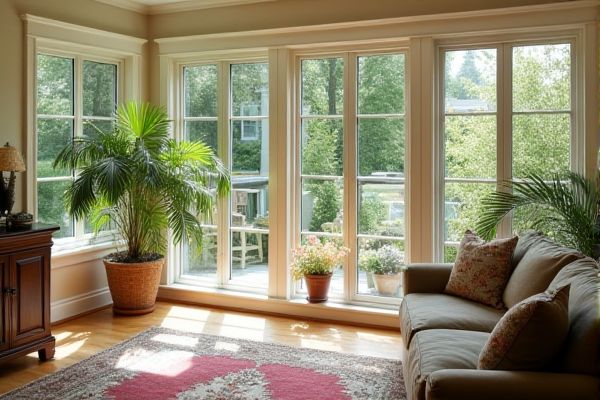
Fixed windows provide excellent insulation and a clear, unobstructed view for your sunroom, while sliding windows offer enhanced ventilation and easy access to fresh air. Explore the benefits and considerations of each option to determine which window style best suits your sunroom design needs.
Table of Comparison
| Feature | Fixed Windows | Sliding Windows |
|---|---|---|
| Operation | Non-opening, stationary pane | Sliding horizontally for ventilation |
| Ventilation | No ventilation | Provides adjustable airflow |
| Use in Sunrooms | Maximizes natural light | Combines light with ventilation control |
| Energy Efficiency | Highly efficient due to sealed design | Moderate; some air leakage possible |
| Cleaning | Easy exterior cleaning only | Both interior and exterior accessible |
| Maintenance | Low maintenance, no moving parts | Requires periodic track and roller care |
| Cost | Generally less expensive | Higher cost due to mechanisms |
Introduction to Sunroom Window Options
Sunroom window options include fixed windows that provide expansive, unobstructed views and sliding windows that offer easy ventilation and access. Fixed windows are energy-efficient and ideal for maximizing natural light, while sliding windows enhance usability by allowing you to control airflow. Choosing the right window depends on your sunroom's design goals and how you plan to enjoy your space.
Overview of Fixed Windows
Fixed windows in sunrooms provide unobstructed views and maximize natural light by featuring immovable panes of glass. These windows enhance energy efficiency due to their airtight construction, reducing heat loss and air infiltration. Commonly used as accent or picture windows, fixed windows require minimal maintenance and offer a sleek, modern aesthetic.
Overview of Sliding Windows
Sliding windows in sunrooms are designed with horizontal tracks allowing the window panels to slide open or closed effortlessly, providing excellent ventilation and easy access to the outdoors. They maximize natural light and space efficiency, making them ideal for sunrooms where unobstructed views and airflow are priorities. These windows often feature durable materials like vinyl or aluminum, ensuring low maintenance and long-lasting performance in sunroom environments.
Aesthetic Differences: Fixed vs Sliding Windows
Fixed windows offer a sleek, uninterrupted view with expansive glass panes that maximize natural light and enhance the sunroom's aesthetic appeal through minimal framing. Sliding windows provide a modern, functional design that combines visual openness with operability, allowing seamless ventilation without compromising the room's contemporary look. The choice between fixed and sliding windows in sunrooms largely depends on the desired balance of style, light, and practicality.
Ventilation and Airflow Considerations
Fixed windows provide excellent insulation but do not allow airflow, making them less suitable for sunrooms where ventilation is crucial. Sliding windows offer better ventilation options by enabling partial or full opening, enhancing air circulation and temperature control. Your choice between fixed and sliding windows will impact the sunroom's comfort and air quality significantly.
Energy Efficiency: Which Window Type Performs Better?
Fixed windows offer superior energy efficiency compared to sliding windows due to their airtight seals that prevent drafts and heat loss in a sunroom. Sliding windows have moving parts and tracks that can allow air leakage, reducing their insulation performance. Improving your sunroom's energy efficiency is more effective with fixed windows, which maintain consistent temperature control and lower energy costs.
Cost Comparison: Fixed vs Sliding Sunroom Windows
Fixed sunroom windows typically cost less than sliding windows due to their simpler design and fewer moving parts, reducing both material and installation expenses. Sliding sunroom windows, while more expensive, offer enhanced ventilation and ease of operation, which may justify the higher upfront cost for some homeowners. When budgeting, consider that fixed windows have lower maintenance costs over time, whereas sliding windows might incur additional repair expenses due to track and mechanism wear.
Maintenance and Cleaning Requirements
Fixed windows in sunrooms offer minimal maintenance due to their sealed frames, preventing dirt and debris accumulation, while sliding windows require regular cleaning of tracks to ensure smooth operation and avoid buildup that can cause jamming. The absence of moving parts in fixed windows reduces wear and tear, making them easier to maintain over time. Your choice depends on whether you prioritize low upkeep or ease of ventilation through accessible sliding mechanisms.
Security and Durability Factors
Fixed windows in sunrooms offer superior security due to their immovable design, eliminating risks associated with lock failures or forced entry through moving parts. Sliding windows, while providing ventilation options, typically contain tracks and locking mechanisms that may wear over time, potentially compromising durability and security. High-quality materials such as laminated glass and reinforced frames enhance the strength of both window types, but fixed windows generally require less maintenance and present fewer vulnerabilities in security over prolonged use.
How to Choose the Right Window Style for Your Sunroom
Choosing the right window style for your sunroom depends on factors like ventilation needs, aesthetic preference, and maintenance. Fixed windows offer expansive, unobstructed views and excellent insulation but do not open for airflow, while sliding windows provide easy operation and adjustable ventilation, enhancing comfort. Consider your climate, how much fresh air you want, and the overall look you desire to ensure your sunroom is both functional and visually appealing.
 homyna.com
homyna.com